Don't wanna be here? Send us removal request.
Text
Remarkable Filipino writers during POST-EDSA Revolution
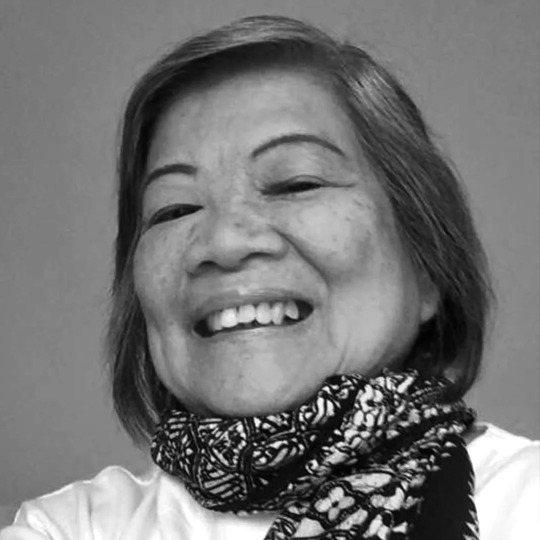
:https://www.rappler.com/tachyon/2021/02/Lilia-Quindoza-Santiago-February-16-2021-sq.jpg?resize=1080%2C1080&zoom=1
Lilia Quindiza Santiago 1949-2021
Lilia Quindoza Santiago, LQS to friends, was an award-winning writer, teacher, anthologist, literary critic, translator, and interpreter, known for her outstanding research on Philippine languages (Ilokano and Tagalog), Southeast Asian studies, popular cultures, gender and sexuality, and literature. In 1972, when the Philippines was placed under martial law by Ferdinand Marcos, she was one of the student activists rounded up, arrested, placed in detention centers, and tortured by the military. She was chosen Makata ng Taon of 1989 by the Surian ng Wikang Pambansa (now the Komisyon sa Wikang Filipino) for her powerful poem “Sa Ngalan ng Ina, ng Anak, ng Diwata’t Paraluman”.
:culturalcenter.gov.ph

:https://www.apwriters.org/wp-content/uploads/2020/11/ong-charlson.jpg
Charlson Ong 1960
Multi-awarded fictionist Charlson Ong has made significant contributions in the Philippine literature and some of which were awarded. His creativity as a writer hasn’t gone unnoticed. Some of his works received awards like the Palanca award for his short story, The Trouble in Beijing; a second-place Philippine Centennial Literary Prize for his novel, An Embarrassment of Riches; and several National Book Awards for his works across the years.
:philnews.ph
0 notes
Text
Remarkable Filipino writers during the Period of Third Republic
Alfredo Salanga 1948-1988
Alfredo Navarro Salanga was born in Manila. His father was a doctor and he was the eldest of ten children. He took a Bachelor of Arts degree from the Ateneo de Manila University. He went on to become a poet, fiction writer, journalist and editor. Alfredo Navarro Salanga, a consistent writer of Philippines Panorama Magazine in his column “Post-PrandalReflections”aptly said it: “darkness in the mind and soul is how some forgotten poet puts it. Its suddenness was so profound that we couldn’t but react to it in any other way.”
Sheila Coronel
Sheila S. Coronel, a PANORAMA staff stalwart, reporting on the state of the media during these times said: it was a year of ferment, and change, of old problems made more oppressive by the new throbbing beat of the times.” For journalists, it was a year loaded with libel charges, lawsuits and seditious trials which they gallantly bore as harassment suits. She began reporting in the Philippines during the twilight of the Marcos dictatorship, when she wrote for the underground opposition press and later for mainstream magazines and newspapers. As Marcos lost power and press restrictions eased, she reported on human rights abuses, the growing democratic movement and the election of Corazon Aquino as president.
:journalism.columbia.edu
0 notes
Text
Remarkable Filipino writers during the Period of New Society
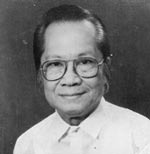
:https://userscontent2.emaze.com/images/9df614ae-2f77-4ea9-a2bc-bb90ce1f2b70/8ab1d27ce94dac74be608af1dd8d963c.png
Ponciano B. P. Pineda 1904-1986
Ponciano B. Peralta Pineda is a Filipino barber, writer, teacher, linguist, and lawyer. As the "Father of the Commission on Filipino Language" for his promotion to establish a commission based on Section 9 of our Philippine Constitution. He became director of Commission on the Filipino Language (Filipino: Komisyon sa Wikang Filipino) formerly Surian ng Wikang Pambansa during the year 1971 to 1999. Under his leadership, Pineda started socio-linguistic research to further widen the Filipino Language.
:prabook.co
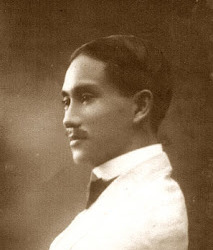
:https://4.bp.blogspot.com/-xckfea8CKj4/VrCzk2-6H1I/AAAAAAAAALM/QzTFcn_ejt8/s320/jcdejesus1.jpg
Aniceto Silvetre 1898-1983
Aniceto F. Silvestre was born in San Mateo, (which is now Rizal Province)
Although there was no formal study in writing, he was able to write and contribute to Filipino literature beautiful poems, short stories, novels and essays. His poems collected in the Nature collection are grouped into eight: Free, Moving, Image of Life, Pulse of Love, Strong of Faith, Sign of Hope, Open to the Path of Greatness and Blood in the Light of Sun.
:peoplepill.com
0 notes
Text
Remarkable Filipino writers during Period of Activism
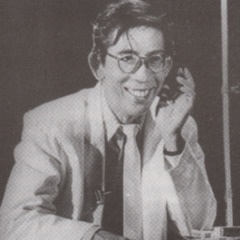
:https://www.secondhandsongs.com/picture/317280
Rolando Tinio 1937-1997
National Artist Rolando S. Tinio was a playwright, actor, poet, translator, teacher, and critic. He was born in Tondo to Dominador Tinio and Marciana Santos. He married theater and film actress Ella Luansing and they were blessed with two children. Apart from attending the University of Sto. Tomas and the University of Iowa for his degree in philosophy and Master in Fine Arts, respectively, he also went to Bristol University taking a Theater Arts course with a scholarship from the British Council.
:philnews.ph

:https://assets.rappler.com/612F469A6EA84F6BAE882D2B94A4B421/img/2223AB51431C4E7B9E5F4259D79F0BDC/rogelio-mangahas_2223AB51431C4E7B9E5F4259D79F0BDC.jpg
Rogelio Mangahas 1939-2018
“Koyang” to his friends and peers in the writing community, Mangahas is a well-loved and respected master poet, essayist, fictionist, literary critic, teacher, activist, and nationalist.
Born in the town of Cabiao in Nueva Ecija province on May 9, 1939, Mangahas grew up with a heightened sense of nationalism and awareness on the plight and struggles of the landless poor. At the height of student activism during the first quarter of 1970, Mangahas joined the ranks of students, farmers, workers, and intellectuals in denouncing corruption, foreign intervention, state violence, and peasant landlessness. In 1971, Mangahas won first prize in the poetry category of the Palanca Awards for his poem, “Mga Duguang Plakard.” He won again the first prize in the Palanca in 1986, this time for his critical essay, “Si Edgardo M. Reyes, Ang manunulat, kanyang akda, at panahon.”
:philippinesgraphic.com
0 notes
Text
Remarkable Filipino writers during the Period Philippine Literature in English
Manuel Viray 1917-1997
Manuel Viray was born in the province of Pangasinan, in the Philippines.
Mr. Viray was a poet, an educator, short story writer and an essayist. He taught creative writing and literary criticism in universities in Manila, Philippines.
He served as a foreign service official in the Philippines Embassies in several countries, including the United States from 1955 to 1973. His last post was Philippines Ambassador to Cambodia, until Phnom Penh fell to the Khmer Rouge.
:findagrave.com
Maximo Ramos 1910-
Maximo Dumlao Ramos led a triple life as teacher, editor, and writer for over 45 years. He was descended from the Dumlao and Ramos farming folk of Paoay, llocos Norte, who pioneered in Southern Zambales early in the 19th century. His first published work would subsequently be about folk beliefs in San Narciso, Zambales. In later work, he explored stories from his childhood in Boyhood in Monsoon Country. He had a B.S.E. from the University of the Philippines (1934), an A.M. from Indiana University ( 1948) where he did course work under Stith Thompson, a TESL from the University of California (1963) where he profited from the tutelage of Wayland D. Hand, Director of UCLA’s Center for the Study of Comparative Folklore and Mythology from 1961-1974. Ramos received his Ph.D. from the University of the Philippines (1965) for his seminal work The Creatures of Philippine Lower Mythology.
:www.swangproject.com
0 notes
Text
Remarkable Filipino writers during Japanese Period
Jose Ma. Hernandez 1904-1982
He graduated valedictorian from the Mabini Intermediate School and received the degree of Bachelor of Science in education from the University of the Philippines in 1928. After graduation, he enrolled at Columbia University for the summer term of 1929. He earned his master’s degree in English, cum laude, from the University of Notre Dame in Indiana. His thesis was, “The Philosophy of Joseph Conrad.” His most significant plays are “Panday Pira,” a historical drama in three acts which was presented by UP’s Rizal Center.
:prodigaldrifter.wordpress.com
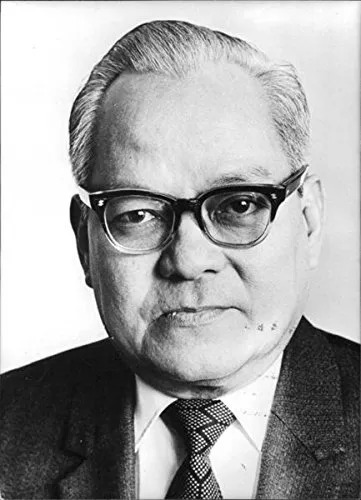
:https://i1.wp.com/www.tagaloglang.com/ux/wp-content/uploads/2018/10/narciso-g-reyes-photo.jpg?resize=361%2C500&ssl=1
Narciso Reyes 1914-1996
Narciso G. Reyes was a Filipino diplomat and author. He served as Chairman of UNICEF from 1972 to 1974 and as Secretary-General of the Association of Southeast Asian Nations from 1980 to 1982. Reyes also served as Permanent Representative to the United Nations and Ambassador to the United Kingdom, China and other countries. In 1945, the best writings were selected by a group of judges, as a result of selection Narciso Reyes got the first place with his Lupang Tinubuan short story.
:peoplepill.com
0 notes
Text
Remarkable Filipino writers during the Period of American Regime

:https://pin.it/6ABf3XM
Sergio Osmeña 1878-1961
Sergio Osmeña was the second president of the Philippine Commonwealth and a distinguished statesman. He led the country in its initial stage of political maturation by his honest and selfless devotion to public service. Sergio Osmeña was born in Cebu on the island of Cebu on Sept. 9, 1878. He entered the San Carlos Seminary in Cebu in 1889 and then earned his bachelor's degree from San Juan de Letran College. His schooling was interrupted by the 1896 revolution and the Filipino-American War. During the revolution he edited the militantly nationalistic periodical El Nuevo Dia.
www.encyclopedia.com

:https://prabook.com/web/show-photo.jpg?id=2342061
Rafael Palma 1874-1939
Rafael Palma born in Tondo, Manila, studied at the Ateneo de Manila. Worked in the Bureau of Lands in the Spanish colonial government until he lost his job with the capture of Manila by the Americans in August, 1898. He joined La Independencia, the revolutionary newspaper founded and directed by General Antonio Luna, succeeding as editor of the paper after General Luna was killed on June 4, 1899. When the paper closed, upon the invitation of Sergio Osmeña, he moved to Cebu from April to December, 1900, working in El Nuevo Dia (which he co-founded with Jaime C. de Veyra). He returned to Manila in January, 1901, and co-founded El Renacimiento where he worked until March, 1902.
:philippinediaryproject.com
0 notes
Text
Remarkable Filipino writers during the Period of Enlightenment

:https://pin.it/3VRTrUa
Graciano Lopez Jaena 1856-1896
Graciano Lopez Jaena was born on 18 December 1856. He began his involvement in the propaganda movement at home in Iloilo, where he wrote “Fray Botod,” a satire on friars.
He then escaped to Spain where he became the first editor-in-chief of La Solidaridad. He also wrote various speeches and articles admired by his peers and sympathizers of the Filipino cause. He died in Barcelona, Spain on 20 January 1896.
:thephilippinestoday.com
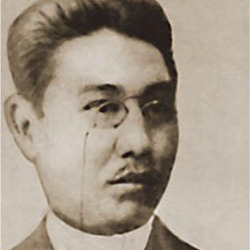
:https://www.bulatlat.com/wp-content/uploads/2019/11/mariano-ponce.png
Mariano Ponce 1863-1918
On March 23, 1863, Mariano Ponce, a Filipino physician noted for his works and contribution in the Philippine Revolution, was born in Baliuag, Bulacan.
he joined Marcelo del Pilar, Graciano López Jaena and José Rizal in the Propaganda Movement which espoused Filipino representation in the Spanish Cortes and reforms in the Spanish colonial authorities of the Philippines.
He wrote in the propaganda publication La Solidaridad (The Solidarity) pertaining to history, politics, sociology and travel under various pseudonyms some of which were Naning, Kalipulako, and Tigbalang.
:kahimyang.com
0 notes
Text
2 Remarkable Filipino writers in Period of Pre-Colonial

:https://pin.it/6Cn62OH
José Protasio Rizal Mercado y Alonso Realonda (Jose Rizal) 1861-1896
José Rizal became part of the Propaganda Movement, connecting with other Filipinos who wanted reform. He also wrote his first novel, Noli Me Tangere (Touch Me Not/The Social Cancer), a work that detailed the dark aspects of Spain's colonial rule in the Philippines, with particular focus on the role of Catholic friars. The book was banned in the Philippines, though copies were smuggled in. Because of this novel, Rizal's return to the Philippines in 1887 was cut short when he was targeted by police.
:www.biography.com

Marcelo H. del Pilar 1850-1896
Filipino writer also popularly known by his pseudonym Plaridel. Marcelo H. del Pilar married his cousin Marciana del Pilar in 1878, and had seven children, of who five died young. Almost a year after he moved to Spain, del Pilar became the editor of the newspaper ‘La Solidaridad and took his anti-friar movement forward with the help of the tabloid. However, the later conflict between him and Rizal caused significant damage to the newspaper after Rizal respectfully declined the position of the "Responsable" and left for France.
:www.thefamouspeople.com
0 notes
Text
POST-EDSA REVOLUTION (1986-1995)

:https://pin.it/6x5Wy4L
The Philippines was praised worldwide in 1986, when the so-called bloodless revolution erupted, called EDSA People Power’s Revolution. February 25, 1986 marked a significant national event that has been engraved in the hearts and minds of every Filipino. This part of Philippine history gives us a strong sense of pride especially that other nations had attempted to emulate what we have shown the world of the true power of democracy.
The true empowerment of democracy was exhibited in EDSA by its successful efforts to oust a tyrant by a demonstration without tolerance for violence and bloodshed. Prayers and rosaries strengthened by faith were the only weapons that the Filipinos used to recover their freedom from President Ferdinand Marcos’s iron hands. The Epifanio de los Santos Avenue (EDSA) stretches 54 kilometers, where the peaceful demonstration was held on that fateful day. It was a day that gathered all Filipinos in unity with courage and faith to prevail democracy in the country. It was the power of the people, who assembled in EDSA, that restored the democratic Philippines, ending the oppressive Marcos regime. Hence, it came to be known as the EDSA People Power’s Revolution.
The year 1986 demarcates the beginning of new scene in the unfolding narrative of contemporary Philippine Literature. The fall of President Marcos's dictatorship, was a prolific event for different Filipino writers and group. Writing under the Martial Law Regime was characterized by militancy and belligerence even when it showed up in legal press.
The Filipino people reclaimed their independence, which they had previously lost. The so-called People Power (Lakas ng Bayan) won on February 21-25, 1986, over the course of four days. There have already been a number of changes in the short time original the Republic of the Philippines has existed. It was noted in recent Filipino songs, speeches, newspapers and even television shows. The INQUIRER, MALAYA, and the PEOPLE'S JOURNAL were the nowcrony publications that experienced a spike in circulation overnight.
:philippine-history.org
0 notes
Text
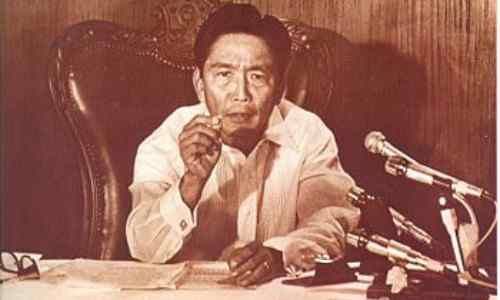
:https://pin.it/6bRH72v
The year 1972 of September 21, the period of New Society started. President Marcos promoted the New Society, which he said was intended to bring about a significant societal shift, with the imposition of martial law. In order to establish a favorable impression in the public's mind as well as in the local and international media that he was serious about enacting these changes. The new society tried to stop pornography or those writings giving a bad influence on the morals of the people.
:PhDessay.com
0 notes
Text

:https://pin.it/6SDLKPL
The year of nineteen seventy to seventy two As a result of social issue, Youth were motivated to seek reforms Some armed groups were formed
They fight for what they wanted in this situation Young people inspired by nationalism wrote with passion, To express the desire for change To emphasize the significance of their petition
Writers were imprisoned in this period of history Together with young activists were imprisoned in military, We may say they are many A true heroes, they are really
0 notes
Text

:https://pin.it/6NCVd3K
Not with knives my heart he tore When he brought me to death's door Was not his hand had me slain I'm imprisoned in this pain
1 note
·
View note
Text

:https://pin.it/22CpmZF
You touched my head, touched my ears Took off my mask, showed my fears Kissed my eyes, kissed my lips Left me in dark like eclipse
1 note
·
View note
Text

:https://pin.it/2uY4fNs
Tried to love him as his friend Then love him as his lover, He never loved me in end His heart was for another
2 notes
·
View notes
Text

:https://pin.it/5KX7E9F
When the saddened sun won't shine When the stars will not align, You'd rather inside your bed Covers pulled above your head
1 note
·
View note
Text

:https://pin.it/3NzxGN7
If you ever forget me And if you stop loving me, Then I shall stop loving you For I shall forgotten you
1 note
·
View note